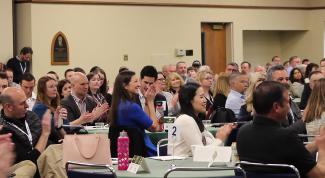More than 250 IT leaders from state agencies and leading technology companies attended a WaTech IT Industry Forum & AI Summit on March 25 to explore using artificial intelligence (AI) to improve government services and ensure equitable outcomes for Washington residents.
WaTech Director and State CIO Bill Kehoe kicked off the event, urging the audience to brainstorm new ways of doing business using AI.

"We can talk about guidelines and executive orders all day long, but how can we use this? What are some really good use cases so our agencies can start to implement and solve business problems with AI?" he said, asking the audience to reflect on how difficult it can be today for Washington residents to navigate state government to get the services they need.
Participants during the event took a deep dive into the potential of AI to transform public sector operations, highlighting the state's commitment to staying at the forefront of technology-led service delivery.
Two roundtable sessions during the summit created an exchange of ideas around the ethical integration of AI in government operations, with a focus on enhancing decision-making, service delivery, and policy development. Discussions included mitigating AI bias, harnessing AI to streamline state operations, and fostering accountability.
There were also panel discussions that explored AI’s potential to greatly benefit humanity and its capacity to challenge our security and ethics.
Bill emphasized that AI is more than a passing trend, it’s become a fixture of the IT landscape that holds immense potential for public service. He noted Washington's readiness, citing foundational steps that have already been taken such as the governor's executive order and the establishment of AI guidelines.
He ended the summit with a clear message – it’s time to move from planning to action.
"Let's use this for good—to help our staff, our business leaders, our back-office processes be more efficient, help answer questions, help engage our residents in a more efficient manner. That's what we're about," he said.
